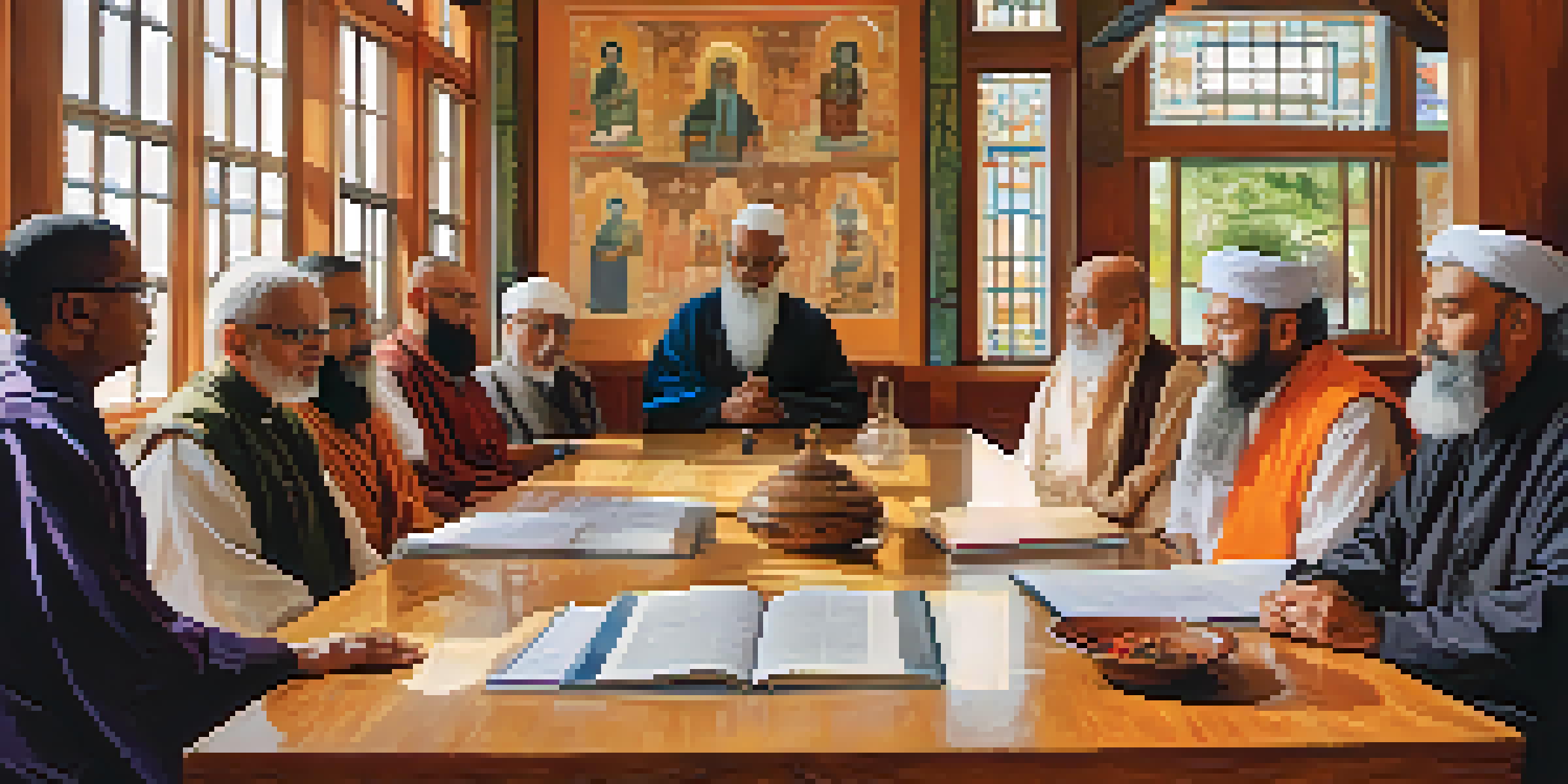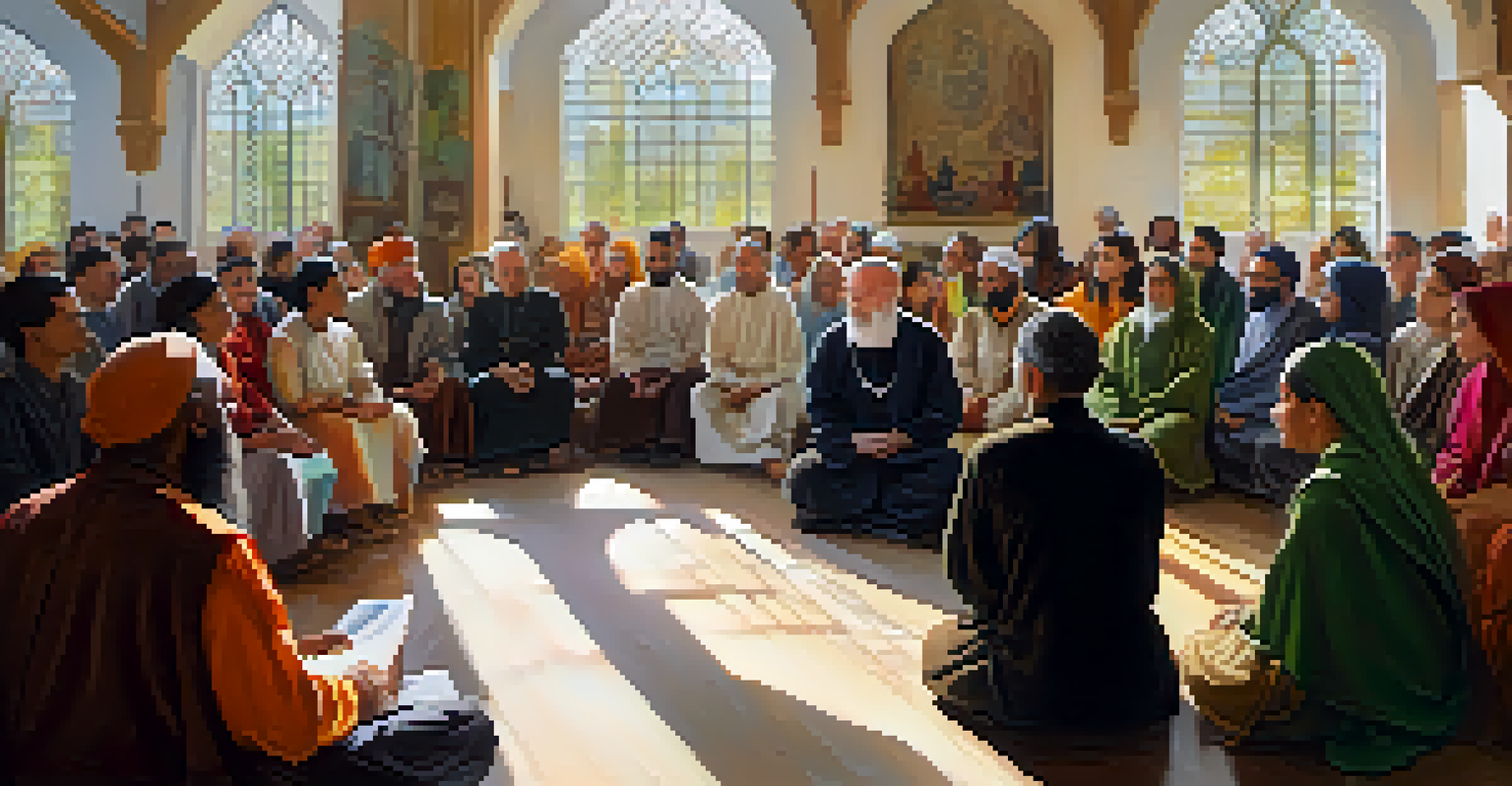Religious Leaders: Key Players in Interfaith Cooperation

Understanding Interfaith Cooperation and Its Importance
Interfaith cooperation refers to the collaborative efforts among different religious groups to promote mutual respect and understanding. In a world often divided by belief systems, these initiatives are crucial for peace and coexistence. Religious leaders play a pivotal role in facilitating these dialogues, acting as bridges between diverse communities.
Peace cannot be kept by force; it can only be achieved by understanding.
By engaging in interfaith activities, leaders can help dismantle stereotypes and foster empathy. For instance, when a Christian pastor and a Muslim imam come together for community service, they not only serve their neighborhoods but also set a powerful example of solidarity. This collaboration can inspire followers to adopt a more inclusive mindset.
Ultimately, interfaith cooperation is about finding common ground while respecting differences. It encourages individuals to look beyond their own beliefs and appreciate the shared values that unite humanity, such as compassion and kindness.
The Role of Religious Leaders in Building Trust
Religious leaders often hold significant influence within their communities, making them key players in promoting trust between different faiths. Their moral authority can help dispel misconceptions and reduce fear about the 'other.' When leaders openly discuss their values and beliefs, it creates a safe space for dialogue and understanding.

For example, a prominent Buddhist monk may engage with Christian leaders to explore themes of compassion and forgiveness. Such interactions can lead to deeper insights and respect among followers. When leaders model this behavior, they encourage their congregations to do the same, ultimately fostering a culture of trust.
Interfaith Cooperation Builds Trust
Collaborative efforts among different religious groups foster mutual respect and understanding, crucial for peace.
Building trust takes time, but religious leaders can expedite the process through consistent and transparent communication. By actively participating in interfaith discussions and initiatives, they demonstrate a commitment to peace and collaboration, reinforcing their role as trusted figures.
Promoting Peace Through Interfaith Dialogues
Interfaith dialogues serve as a platform for addressing conflicts and misconceptions that can arise from religious differences. Religious leaders can mediate these discussions, ensuring that all voices are heard and respected. This approach not only fosters understanding but also encourages peaceful resolutions to disputes.
The highest form of ignorance is when you reject something you don’t know anything about.
An excellent example is the annual interfaith peace summit, where leaders from various religions come together to discuss pressing global issues. By focusing on shared concerns, such as poverty and violence, they can work together to find solutions that benefit everyone. This collective effort highlights how collaboration can lead to tangible change.
Moreover, these dialogues can inspire grassroots movements, where community members engage in local projects that promote peace. When religious leaders advocate for cooperation, they empower their congregations to take action, creating a ripple effect of positive change throughout society.
The Impact of Shared Community Initiatives
Shared community initiatives, such as food drives or charity events, can effectively bring together people from different faith backgrounds. Religious leaders often spearhead these efforts, emphasizing the importance of service to others regardless of belief. This hands-on approach fosters camaraderie and mutual respect among participants.
For instance, a local interfaith group might organize a charity event to support refugees, drawing on resources and volunteers from various religious communities. Participating in such initiatives not only helps those in need but also strengthens relationships among different faith groups. Leaders who champion these causes become role models for their followers.
Educational Initiatives Promote Understanding
Religious leaders play a vital role in organizing educational events that encourage respect for diverse beliefs.
These collaborative efforts also provide an opportunity for interfaith learning and cultural exchange. When individuals from different backgrounds come together to work towards a common goal, they gain insights into each other's traditions and values, enriching their own understanding of the world.
Educational Efforts by Religious Leaders
Education is a powerful tool for promoting interfaith understanding, and religious leaders often play a crucial role in this area. By organizing workshops, seminars, and discussions, they help their communities learn about different faiths. Education fosters respect and curiosity, which are essential for peaceful coexistence.
For example, a religious leader may host a series of lectures on the beliefs and practices of various religions. These events allow participants to ask questions and engage in meaningful conversations. Such educational initiatives can dispel myths and encourage individuals to explore beliefs beyond their own.
Moreover, integrating interfaith education into religious institutions can create a culture of openness. By instilling values of tolerance and respect for diversity in younger generations, religious leaders ensure that the next wave of community members is better equipped to foster understanding and cooperation.
Challenges Faced by Religious Leaders in Interfaith Work
Despite their influential roles, religious leaders often face challenges in promoting interfaith cooperation. One major obstacle is the resistance from within their own communities, where deeply held beliefs may create barriers to dialogue. Navigating these sentiments requires skill, sensitivity, and a strong commitment to fostering understanding.
Additionally, external pressures, such as political tensions or societal divisions, can further complicate interfaith efforts. Religious leaders must work diligently to maintain focus on shared values and the importance of cooperation, even when faced with adversity. This can be a daunting task but is essential for building bridges.
Challenges in Interfaith Dialogue
Religious leaders face internal and external resistance, making their commitment to fostering understanding essential.
To overcome these challenges, leaders can benefit from collaboration with like-minded individuals and organizations. By forming alliances with those who share their vision of interfaith cooperation, they can amplify their efforts and create a more significant impact on their communities.
Future Directions for Interfaith Cooperation
As the world becomes increasingly interconnected, the role of religious leaders in interfaith cooperation is more critical than ever. Moving forward, there is a growing need for innovative approaches that engage younger generations in these dialogues. By harnessing technology and social media, leaders can reach a broader audience and encourage participation.
For example, virtual interfaith forums can bring together individuals from various backgrounds, allowing for discussions that transcend geographical boundaries. These platforms can facilitate ongoing conversations and foster relationships among diverse communities. Engaging the youth in these initiatives ensures that the values of respect and understanding are passed down to future generations.

Ultimately, the future of interfaith cooperation lies in the hands of committed religious leaders who are willing to adapt and innovate. By embracing new methods of communication and collaboration, they can continue to inspire unity and understanding in an ever-changing world.